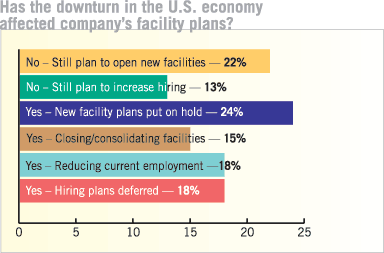23rd Annual Corporate Survey Analysis by Dean J. Uminski
Dec/Jan 09

Business leaders who have to reduce four or five locations to two or three - or 20 locations to five - must approach the task as rigorously as they would were they expanding the physical presence of their business. The same strategic factors that come into play when building a network of manufacturing facilities, distribution centers, retail locations, or offices also apply when an organization reduces its scale to fit changing times.
While the percentage of respondents to Area Development's 23rd Annual Corporate Survey who said they decreased their number of facilities in 2008 (12 percent) remained consistent compared with 2007 (13 percent), one new question in this year's survey augers ill for 2009. When asked if the downturn in the U.S. economy affected their company's facility plans, many respondents answered affirmatively, reflecting serious concern about the unknown length or severity of the economic downturn. These respondents said they are putting new facility plans on hold (24 percent), reducing staff (18 percent), deferring hiring plans (18 percent), and closing or consolidating facilities (15 percent). In contrast, only 22 percent of respondents said their companies still plan to open new facilities or increase hiring rates (13 percent).
Shrinking access to credit and capital, reluctance by both retail and corporate customers to spend, and increased pressure on margins are forcing businesses everywhere to reassess and rationalize their physical assets. Making the decision to close one or more locations is never easy but sometimes is unavoidable. And while business incentives can rarely make a poor location viable, they could be a factor that sways a company's decision to locate in one jurisdiction versus another in today's economy.
However, because many incentives reward job creation, they might not provide as much benefit to businesses that must contract their work forces. State and local governments wanting to attract consolidating businesses to their jurisdictions in these difficult times need to consider offering more incentives that recognize other social and economic contributions, such as environmental efficiency and sustainability.
Project Announcements
La Colombe Coffee Roasters Expands Norton Shores, Michigan, Operations
02/23/2026
GRVTY Plans Tysons, Virginia, Headquarters Operations
02/23/2026
Hudson Industries Expands Appleton City, Missouri, Operations
02/23/2026
Israel-Based Katz 1899 Plans Dayton, Ohio, Manufacturing Operations
02/23/2026
Chick-fil-A Supply Plans Winter Haven, Florida, Logistics-Distribution Operations
02/17/2026
Annandale Millwork and Allied Systems Plans Newport News, Virginia, Operations
02/17/2026
Most Read
-
Top States for Doing Business in 2024: A Continued Legacy of Excellence
Q3 2024
-
Data Centers in 2025: When Power Became the Gatekeeper
Q4 2025
-
Speed Built In—The Real Differentiator for 2026 Site Selection Projects
Q1 2026
-
Preparing for the Next USMCA Shake-Up
Q4 2025
-
The New Industrial Revolution in Biotech
Q4 2025
-
Strategic Industries at the Crossroads: Defense, Aerospace, and Maritime Enter 2026
Q1 2026
-
The Skilled Trades Are Ready for a Digital Future
Q4 2025